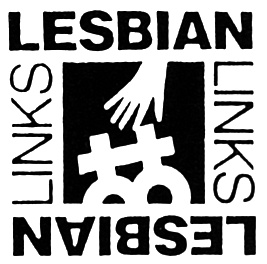This essay written by Moira Margaret was first published in Women Together: a History of Women's Organisations in New Zealand in 1993.
Lesbian Links, a Hamilton organisation, provided a supportive, safe environment for lesbians to meet, information on local lesbian events, and an upfront community organisation for lesbian visibility. It also offered Māori lesbians the opportunity to link into a local Māori support organisation. It provided a one-to-one counselling service with lesbian counsellors recognised by the collective; some were members of Lesbian Links.
The organisation began toward the end of 1987, when the homosexual law reform campaign had heightened awareness of lesbian and gay issues. Two lesbians involved in social work and counselling were being approached by others who wanted to be put in touch with lesbians and lesbian events. There was also a specific need for a 'coming out' group.
Meetings were held to gauge support for providing a Lesbian Links service. The local committee of the Coalition on the Homosexual Law Reform Bill gave a grant, and approximately eighteen lesbians offered to be collective members. They were rostered in pairs to facilitate a Tuesday evening drop-in centre and phone line for lesbians, based at the Hamilton Women's Centre. Both services were busy from the start; the phone line received many calls from people, including parents, wanting to talk or to seek information for themselves or for friends and relatives. In June 1988, Lesbian Links moved to the Waikato Women's Health Action Centre (WWHAC); it could no longer have exclusive use of the Hamilton Women's Centre building on Tuesday evenings, and felt this could deter lesbians who wished to remain anonymous outside the group.
Links advertised the drop-in centre and phone line in the Waikato Times, Broadsheet, and Lesbians in Print, sent information on the group and its services to counsellors and social workers in a wide range of positions, and put together a list of other New Zealand lesbian organisations, local doctors and lawyers supportive of lesbian health and legal issues, and community support services. In the first two years, collective members ran a series of 'coming out' workshops. This enabled the numbers of women trying to decide whether to identify as lesbian to discuss the issues involved and have a support group of women.
The collective shared the work involved, and reached decisions by consensus at pot-luck dinner meetings in members' houses. Twice a year they helped to run the local women's dances, with raffles which kept the organisation afloat financially. Collective members who ran workshops on heterosexism for government organisations donated their fees to Links; and Waiora Waikato (Waikato Area Health Board) funded a collective member to run two workshops on 'Lesbians and AIDS'. However, the organisation always operated on a shoestring budget, and was funded mainly through the lesbian community.
New members joined by having their name put forward by a current member. The criteria for joining included commitment to accept difference, commitment to the Hamilton lesbian and gay women's community, and willingness to accept training. Members who were professionally trained counsellors and educators trained others in facilitating, listening and phone skills, and new members shared time on duty with longer serving members as 'buddies'.
By 1990, with other opportunities available for lesbians to meet, there was less demand for the drop-in sessions. In 1991 Lesbian Links evolved into a phone service run through WWHAC: women who rang could leave their number and a member of Links would call them back. By 1993 this service continued to operate, though the collective was then in recess.
Lesbian Links was one of the first openly existing, widely advertised lesbian organisations in Hamilton. Organised solely by lesbians for lesbians, it was one of the many visible organisations which emerged around the mid 1980s to which any woman wishing to live as a lesbian could turn for assistance and support.
Moira Margaret
Unpublished sources
Glover, Marewa, 'Lesbian Links: An Alternative Organisation Study', BSocSci long essay, University of Waikato, 1991
'Hamilton Lesbian Links Support and Information Service' (pamphlet), Lesbian Links, Hamilton, 1988 and 1991
Lesbian Links records, 1987–1992, in possession of Moira Margaret, Hamilton
Margaret, Moira, Interviews with Maureen and Hazel, Hamilton, April 1992


Community contributions